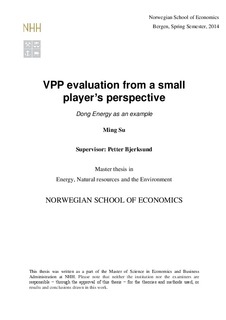| dc.description.abstract | Virtual power plant (VPP),which can be interpreted as a strip of hourly European options, gives the buyers (normally the competitors of the big player in the electricity market) the rights but not obligation to buy an agreed amount of electricity from the big player at a pre-determined price during one specific period. VPP has been used as a tool for regulators to encourage competition in the electricity market since the very beginning of 21th century. During the past years, VPP has mainly been discussed from regulators’ perspectives. In this thesis, we are going to explore the value of VPP from a small player’s standpoint, who wants to participate into VPP auctions (Dong Energy’s VPP product as an example). Before joining the auction, pricing VPP is very crucial for small player to better understand, value and utilize this product. We would like to demonstrate that Black 76 can be used as an effective way for VPP pricing. Pricing is a complex process on an hourly basis. Main factors have been discussed and explained during the pricing process. We conclude that the overall value of VPP is beyond the bottom line, which is the minimum value from Black 76 pricing. It should also include the added value, flexibility in the second nomination. The flexibility value is addressed by illustrating the situation under which the total return from re-nomination is much higher than the first exercise strategy. We also present the risks Dong Energy will face to issue such VPP product in order to reflect the benefits for owning VPP as a small player in a competitive electricity market. Delta analysis and dynamic hedging can also be replicated for small players to manage their potential risk in the future. | nb_NO |
